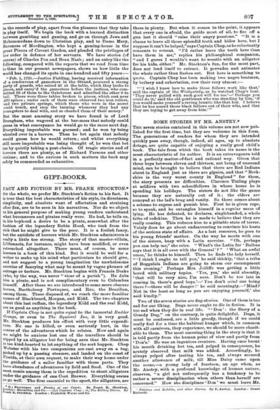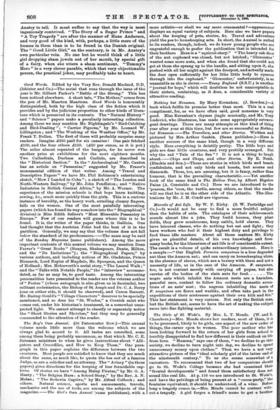SOME STORIES BY MR. ANSTEY.*
THE seven stories contained in this volume are not now pub- lished for the first time, but they are welcome in this form. The generations of readers for whom they are intended quickly pass away, though, indeed, all ages, up to absolute dotage, are quite capable of enjoying a really good child's book. The tale from which the book takes its name is the most characteristic of its author. It is an extravaganza told in a perfectly matter-of-fact and rational way. Given that three boys between eleven and thirteen, not being of unsound mind, can be brought to believe that there are Red Indians about in England just as there are gipsies, and that "Berk- shire is the very worst county in England" for them, the story presents no difficulties. Clarence Tinling plays at soldiers with two schoolfellows in whose home he is spending his holidays. The sisters do not like the game because they are naturally out of it ; the elders are annoyed at the lad's brag and vanity. So there comes about a scheme to expose and punish him. First he is given rope, so to speak, and he entangles himself in a regular maze of lying. He has defeated, he declares, singlehanded, a whole tribe of redskins. Then he is made to believe that they are really coming. This reduces him to a pitiable state of terror. Vainly does he go about endeavouring to convince his hosts of the serious state of affairs. As a last resource, he goes to his young friends' mother. On the way he meets with one of the sisters, busy with a Latin exercise. " Oh, perhaps you can help me," she cries. " What's the Latin for Balbus says that it is all over with the General' ? " What an awful omen,' he thinks to himself. Then he finds the lady herself. " I think I ought to tell you,' he said thickly, ' that a tribe of Boggelala Indians are going to storm our encampment this evening.' Perhaps Mrs. Jolliffe was getting a little bored with military topics. Yes, yes,' she said absently, that will be very nice, I'm sure. Don't be too late in coming in, there's good boys.'—' You don't mind our being there ?—there will be danger !' be said meaningly.—' Mind ? Not in the least so long as you are enjoying yourself,' she said kindly."
Two of the seven stories are dog-stories. One of them is too sad for our liking. Dogs never ought to die in fiction. It is too sad when they die in real life. " ' Don' : the Story of a Greedy Dog," on the contrary, is quite delightful. Doge, it must be confessed, are a little greedy, though if we could really feel for a time the habitual hunger which, in common with all carnivora, they experience, we should be more charit- able to them. The most amusing thing in the story is that it is told partly from the human point of view and partly from Don's.' He was an ingenious creature. Having once burnt • his mouth drinking hot tea, and yelped in consequence, he acutely observed that milk was added. Accordingly, he always yelped after tasting his tea, and always secured another allowance of milk, till Miss Daisy came upon the scene,—a young lady of fourteen, an age when, as Mr. Anstey, with a profound knowledge of human nature, observes, " a girl not nnfrequently has a tendency to be rather a severe disciplinarian when others than herself are concerned." How she disciplines ' Don' we must leave Mr.
Paleface and Redskin, and other Stories. By F. Anstey. London Grant Richards.
Anstey to tell. It must suffice to say that the way is most ingeniously contrived. " The Story of a Sugar Prince " and "A Toy Tragedy" are after the manner of Hans Andersen, and very good of the kind, with, perhaps, a little more of the human in them than is to be found in the Danish original. The " Good Little Girl," on the contrary, is in Mr. Anstey's own particular vein. No one but he would think of a little girl dropping sham jewels out of her month, by special gift of a fairy, when she utters a sham sentiment. " Tommy's Hero " is a very clever parable, which that very objectionable person, the practical joker, may profitably take to heart.























































 Previous page
Previous page